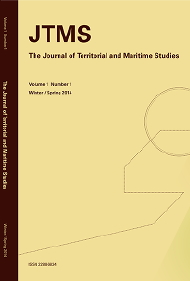동북아역사재단 2014년 01월호 뉴스레터
- Written by Cho Yoon-soo, Research Fellow, Dokdo Research Institute, NAHF

As of January 1, 2014, the NAHF published the first issue of The Journal of Territorial and Maritime Studies ("JTMS") (Vol 1, No. 1 Winter/Spring 2014), an English journal specializing in territorial and maritime issues. The purpose of the JTMS is to allow scholars at home and abroad to communicate territorial, maritime, and border issues. Aiming to be a prestigious journal, the JTMS will be published biannually.
For the publication of the JTMS, the NAHF has organized an editorial committee with world-renowned great scholars. The committee includes: Bruce Bueno de Mesquita (New York University), one of Top 100 scholars named by Foreign Policy; Professor Yan Xuetong (閻學通) (Tsinghua University, China); Johan Galtung (Transcend International, Norway), the founder of peace studies; and Marcelo Kohen (Graduate Institute Geneva, Switzerland), a scholar of international law with worldwide recognition. The committee also includes Korean members: Professor Ha Yong-chool (University of Washington, USA) and Professor Lee Sung-yoon (Tufts University, USA), President Obama's advisor on Korean Peninsula affairs. The chairman of the editorial committee is Lee Hun, Director of the Dokdo Research Institute.
The first issue of the JTMS includes a total of eight select papers/reviews, including 'Territorial Change and Selection Institutions' by Professor James D. Morrow at the University of Michigan. The introduction titled 'The Resurgence of Territorial and Maritime Issues in the Post-Modern Era' by Professor Kim Jae-han (Hallym Univ.), a senior member of the editorial staff, showed how the concept of border had evolved with the times (e.g. pre-modern, modern, and post-modern times).
The first issue also includes a few papers suggesting the implications of Korea's territorial and maritime policy, not just academic theory about territorial and maritime issues. Professor James D. Morrow (University of Michigan, Ann Arbor, USA), through the 'selectorate theory,' which is actively studied in the U.S. recently, illustrated that territorial and maritime policy was closely related to the domestic political system ('The 'selectorate theory' refers to a theory that when determining foreign policy, leaders are aware of certain groups that are necessary for them to remain in power).
Professors Krista Wiegand (Georgia Southern University) and Richard Kilroy Jr. (National Defense University) pointed out, in their respective papers 'Resolution of Border Disputes in the Arabian Gulf' and 'Maritime and Territorial Boundary Disputes in Latin America,' that the International Court of Justice's roles in international territorial disputes have their limits. Wiegand used the Arabian Gulf case in explaining that negotiation through Islam as a religious and regional tradition is more effective than Euro-centric international law in resolving border disputes, and that agreement reached by both parties concerned is a solution more effective than third-party arbitration or intervention. Taking Latin America as a specific example, Kilory point out that ICJ decisions had failed to contribute toward the peaceful resolution of territorial disputes.
Professor Anna Getmansky (Interdisciplinary Center (IDC) Herzliya, Israel), in her paper 'Tourism and Cross-Border Conflict: An Empirical Analysis of the Israeli-Palestinian Case,' presented a skeptical view on the "Peace Through Tourism" campaign advocated by some people around the world. She argued that it was one thing to open certain domestic areas for tourism purposes, but easing conflict was something completely different. Barthélémy Courmont, researcher at the Institute of International and Strategic Relations, France, analyzed Taiwan's territorial diplomacy in his paper 'Territorial Disputes and Taiwan's Regional Diplomacy: The Case of the Senkaku/Diaoyu/Diaoyutai Islands,' suggesting that the scope and direction of the territorial diplomacy that a divided nation can take is limited. Professor Koh Sang-doo (Yonsei University), in his book review 'Features of Territorial Disputes in Northeast Asia,' gave a critical review of the literature on conflict between China and Japan, including The Perils of Proximity: China-Japan Security Relations by Dr. Richard Bush.


